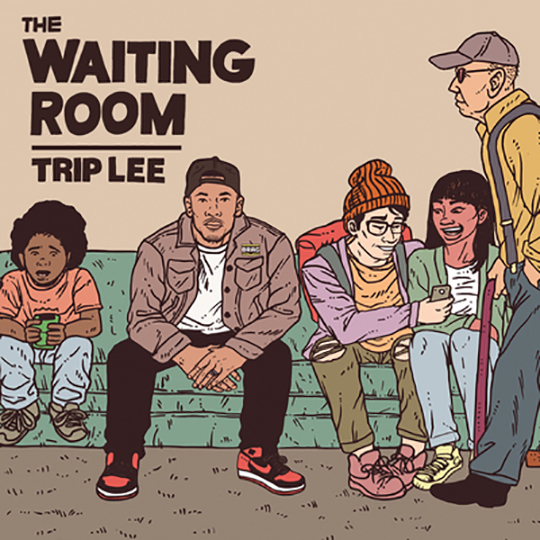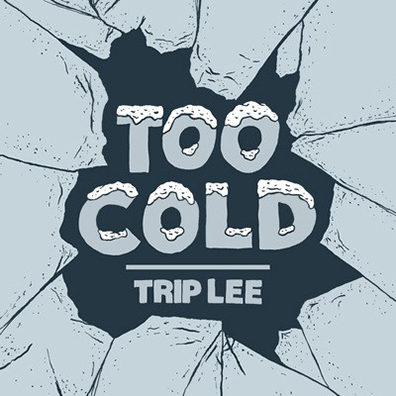Our Trip Lee Interview – Conversations In The Waiting Room
Christian Rap artist, author and pastor, Trip Lee emerged on the music scene right around 2006, with the release of his debut album, If They Only Knew. Trip was a young talent with a passion for music, but he had little expectations of being accepted by a mainstream audience. Fast forward 10 years and Trip is coming off a highly successful fifth album, titled Rise, which peaked at number 2 on the Billboard Rap charts.
Trip is back, ready to take on the final month of 2016 with new music. His new mixtape, The Waiting Room, is set to become available on Friday December 9th. The title represents the metaphor that is life. “This whole life is a waiting room and even though our generation, we don’t like to wait for anything—we want it right away, we need to understand that waiting is not an option,” Trip explains.
I caught up with Trip Lee during a recent trip to New York City to talk about The Waiting Room, his latest book, how he’s felt about his move to Atlanta to become a pastor, the Trip Lee BRAG website, his health and battle with Chronic Fatigue Syndrome, his other upcoming projects and much more. Check out the Trip Lee interview below.
Parlé Mag: Let’s start off where we left after our last Trip Lee interview, which was right before the release of your last album Rise. How’d you feel about the success of that project?
Trip Lee: I felt great about it. That’s the interesting thing about putting out music. You try to perfect it, work really hard, it’s like my baby by the time I put it out there, so any time people love the music, support the music, it means a lot to me. The response was dope. Two songs in particular people responded to and really loved, one was “Sweet Victory” that’s the song where I hear the most people say it had a big impact on them. I’m talking about my health and being in the midst of that. People all the time will come up to me and say, ‘I got M.S. and this helps me,’ or ‘I have cancer and I listened to that during chemo‘, or ‘I was suicidal and that song saved my life‘, so that means a lot to me.
And then “Manolo” is another one that really caught on. The thing with that one is there are hundreds of dance videos to it—it caught on in the dance community for some reason. So that was dope too. It’s always cool for me to sit in my office or in the studio and write a song, work on it and then to see how it just spreads and goes all over the place.
Parlé Mag: The new mixtape is about the drop, The Waiting Room, how long did it take for you to put this project together?
Trip Lee: I started working on it in about March and originally I was just going to do an EP and record it all in a month, but it really didn’t go that way. The music felt like it deserved more than just that little bit of time and it’s hard for me to just put a bunch of music out. I want it to be great, I’m a bit of a perfectionist. And then we decided that we didn’t just want to do an EP because I had a lot of songs that we really loved. I just kept kinda grinding on it—and I do a lot of other stuff too, I’m a pastor, I write, so I took some time away from it and then came back to it. So yeah, it started in March and I just kept slowly chipping away at it and getting it together.
Parlé Mag: Why a mixtape and not a full album? I mean, once you have ten songs, you might as well do an album?
Trip Lee: Yeah yeah, part of it was I had a concept for the album and a timeline for the album already in mind, but people kept hitting me up asking about new music, ‘we want to hear something from you and we want to hear what you doing’. I really wanted to give them something in the mean time. I did think about, eh, why don’t we just turn this into the album, but I felt like let’s do the mixtape, let it lead up into the album and keep grinding on the album.
Parlé Mag: Right right.
Trip Lee: And mixtape is such a loose word now. I don’t man…
Parlé Mag: Yeah, I don’t know what it means anymore either. Okay transitioning to the single, “Too Cold”.
Trip Lee: That one, I worked on with my dude GAWVI; he worked on my entire last album. We wanted to do a joint with energy and we started working on it even before I knew I wanted to do a mixtape. It was just like, let’s work on it and see what happens. We were like let’s just think of a catchy chant and that ended up being TOO COLD. That was like a year and a half ago and I ended up just holding onto the track. But I needed to make some changes to it. That was one that almost didn’t make the project because it was just okay. I literally wrote to that song like ten times. The beat was amazing but every time I did it, it was just okay. I didn’t want it to be just okay, so I was literally like this is the last time I am going to write to this song, and if it isn’t right I just gotta let it go. And as soon as I finished it, I knew we had it, everybody loved it. It was crazy because it ended up being the single even though it was the one giving me the most problems.
Parlé Mag: What would you say is the meaning behind the track?
Trip Lee: The meaning behind the song, I thought about a lot of different ways to talk about this, but what I ended up settling on was—as you know I’m kind of in a unique space as an artist and there’s pressure all the time to change to kind of fit more of the Hip-Hop mold, pretend to be more of a gangster, pretend to be some things that I am not. To kind of hide my love for God and stuff like that, but that was just another song of me declaring that people are not going to be able to just move me and tell me to do this or that. I’m going to be who I am. I do love God, I’m going to be the kind of rapper that I am and I’m going to make the kind of music that I make. And I am just going to press on with the music.
Parlé Mag: That said, are you happy with your spot in music and the industry right now?
Trip Lee: I was talking about this earlier. When I first started, my first album, that was 2006. I wrote it while I was in high school. I said on a song, “And I don’t care if I never make the Billboard charts…” and I never thought I would. I never thought a rapper like me was going to be able to. My next album ended up really low on the Billboard 200 charts and I was was surprised for it to be on Billboard at all. For the last album to rise to be number two when it came out, that was really crazy for me. So I am really pleased. But more than that, the impact I see that the music makes, the people that enjoy it and who are impacted by it, I love it and I want to just keep on pressing and hopefully more and more people will continue to enjoy it.
Parlé Mag: You moved from Dallas to Atlanta to become a pastor and start a church. That’s a big transition, what inspired you to make that move?
Trip Lee: People used to ask me if I wanted to be a pastor and I would say, ‘no, I don’t’. I do love God and I love the bible but I don’t think I want to walk with people and pastor. I was at a church in Philly when I was there for a bit, and I saw some young guys, some cool dudes who were pastors in the church I was at, they started their own church. And I really saw what kind of men they were and how faithful they were, solid men helping people understand the word and helping people walk the path and so I thought, I think I want to serve people like that. And over time that kind of desire to do that—to help people through hard stuff, to guide them through the word. I think about people who live in my neighborhood now and what they think it means to be a Christian, they have these crazy pictures of it. They think it means pretending to be better than everybody else or pretending like you don’t have any mess or trying to act perfect so that everybody likes you, when it’s the opposite of that. God knows you messed up and Jesus died because we are messed up and so we can be brought to him by favor. That message is the passion of my life and its what drives me and so I wanted to help lead a church. I had some friends who were in Atlanta, and there’s a neighborhood—West End—it’s where Morehouse, Clark and Spellman are on the West End so it’s a needy neighborhood, the oldest neighborhood in Atlanta and the kind of neighborhood that I wanted to serve, an urban neighborhood, a neighborhood that was predominantly black, that was needy and I wanted to do it with some other brothers who I wanted to walk with, so I moved into the neighborhood and it’s going well.

Parlé Mag: Are you liking the journey right now and the decision to get into pastoring?
Trip Lee: Yeah man, it’s weird, the hard thing is there are no other pastors who I can look to whose trajectory looks like mine and there are no other rappers who I can look to. So I’m always in this weird space where I’m kind of doing my own thing. But I’m enjoying it man. It’s a privilege to do anything that I love, much less a lot of things that I love. So I’m grateful for it. It’s been cool. People think that rapper/pastor thing is weird. The only reference people really have is Ma$e so I love being able to say, hey, it’s not what you think. I know you probably think my music is wack or I know you probably think I’m not really a pastor, but those things don’t have to be in tension. They can co-exist.
Parlé Mag: What’s been the biggest struggle doing it, you would say?
Trip Lee: The hardest thing is that when you’re one of the leaders of a church you just see all the stuff that’s going on in people’s lives so it’s a heavy burden to bear. You got this person who’s dealing with mental illness and then you got this person, their marriage is really struggling and then you got these people, their grandfather just passed… so I mean it’s a lot of burdens and you walk with people through it, but there is a thing where if I don’t deal with it well it can just drive me crazy or I can think it’s my job to change people’s hearts and I know I can’t change anybody and I’m not the person that’s going to be able to give people the strength they need so it’s a privilege to walk with people. Plenty of hard stuff about it but plenty of good stuff about it. Kind of like getting married and having kids, it’s hard stuff and some unique joys so it’s worth it.
When he was nineteen years old, Trip Lee was diagnosed with Chronic Fatigue Syndrome, a complex disorder where the main symptom is extreme fatigue. The disorder is not explained by any other medical conditions and the symptoms don’t necessarily ease up with rest. An estimated one million Americans suffer from Chronic Fatigue Syndrome, but all things considered that is such a small segment of the population that actually treatment has not been discovered yet.
Trip Lee talks about the condition a lot in his music and writes about it on his website, but I figured I would visit the topic for a couple questions during my Trip Lee interview…
Parlé Mag: Your illness, Chronic Fatigue Syndrome, how did you first find out about it?
Trip Lee: Chronic Fatigue Syndrome is an illness where most people it happens suddenly. I had no issues with energy my whole life. I was kind of like my mom, one of those people who wake up early and they good. Then when I got back to school for my second year of college I wasn’t feeling well and I ended up crashing. I was sleeping like 18 hours a day and I was still tired for the few hours I was up. So when that went on for more than a week or two I knew something was clearly wrong. I went to the doctor, they thought it was other stuff. Long story short, I went to a bunch of doctors and they said yeah, you have chronic fatigue syndrome. There’s no cure for that and doctors don’t even understand it that well to say here’s an exact treatment and you’ll be better in let’s say 5 weeks. It’s been a journey man, it’s been up and down. In that original season of it I was so handicapped I was failing all my classes because I didn’t have enough energy and there’s been some seasons where it really hasn’t bothered me as much. This last year it’s been up and down. I definitely write about it a lot too, I have a lot of songs on The Waiting Room about it because those are the songs people really connect with. Like ‘oh his life ain’t perfect either’ and ‘he got stuff that he pushing through too’. It helps people relate.
Parlé Mag: Would you say the syndrome has been extremely limiting in the amount of work you’ve been able to do or in the amount of music you’ve been able to put out?
Trip Lee: Absolutely. It limits me in every area. I tell people all the time, it is the hardest part of every area of my life. So it’s the hardest part of my marriage, it’s the hardest part about my music, hardest part about pastoring, everything. There’s a book that I’m working on now that I was supposed to be working on a year and a half ago and have coming out now. Mixtape was supposed to come out a lot earlier. And even pastoring, like, I tried to work on a church staff before 9 to 5 and my body couldn’t handle it. I didn’t realize how perfect it was that I was rapping and I was my own boss. I had to turn the music in by a deadline, but I didn’t have to work certain hours. So it’s very, very limiting and it’s up and down and unpredictable. So that makes it hard. That’s what I talk about a lot in the music—it shows me that I can’t just depend on my strength. Who knows how strong I can be because it changes from minute to minute. If I place my worth and my value on how much I’m able to do then I’ma be depressed all of the time. That’s one of the things that helps me see I have to depend on more than myself if I’m really going to make it through.
Parlé Mag: Let’s talk about your website www.builttobrag.com, you go pretty in depth with that including talking about everything from your “white wife” to providing song lyrics and much more, tell me about why you decided to start that.
Trip Lee: When I first became a Christian I was a teenager so I’m unique in that I’m a little nerdy so I like to read a lot and learn a lot. I was reading stuff that most kids would say, no, I don’t want to read that. I just thought that I want people to think differently about life and about God and about marriage and I want them to be able to hear it from somebody that looks like them. And that’s why I write books too. I want people to be able to hear from someone that they relate to. And I want to help people think deeply. A lot of time when we’re young we think, ehhh when I get older I will start to think about stuff that matters and I want to say, naw dont waste your life when you’re young. Sometimes these are our best years. This is when we have the most energy, we don’t have as much stuff that’s tying us down and we can really use our life on stuff that matters. So I wanted to be able to do content that helps people think deeply about life and God, from a voice they can relate to.
Parlé Mag: Talk to me about your latest book.
Trip Lee: The book is called Rise and it’s kind of along those lines of what are the unique challenges—so one, the foundation we were created for something, God made us to be a part of this big story he’s creating and so no putting that off until we get older. I compare it to like hitting the snooze button on your phone a million times, setting multiple alarms, 7:45, 7:50, 7:55, 8:00, that’s like me, I hit snooze a bunch of times and we act like if we get 5 more minutes it’s going to change the world or something and it’s the same thing with life and living the way we were made to live. ‘Ahhh I’ma wait til I’m 35 or I’ma wait til I’m 50’ and I just wanted to say, don’t do that, let’s right now, whatever season your in, let’s do what you were made for and live life for what matters. And again I want people to hear it from a voice that looks like them and understands the type of world they live in. We were made to live while we were still young.

Parlé Mag: Transitioning back to the mixtape, why did you decide to title it The Waiting Room?
Trip Lee: The Waiting Room, one because people are waiting on new music from me. Also, I talk about my health a lot so you think about a waiting room. AND I wanted to think of this whole life, it’s like a waiting room. We are all waiting on something. I can be an artist waiting to get a deal or I can be wanting to get married waiting for a spouse, a lot of people waitimg for a raise so they can fees their family or you know waiting for a day where Black people don’t feel like we’re unwelcome in this country. Or waiting for God to bring true justice. This whole life is a waiting room and even though our generation, we don’t like to wait for anything, we want it right away, we need to understand that waiting is not an option. There’s a lot of waiting for stuff that you’re just not going to have right now. So you just have to understand that you’ll be waiting for a lot of stuff and I just wanted to deal with some of those things on the record.
Parlé Mag: A lot of people still see Christian Hip-Hop and they automatically won’t touch it, but if there’s one track on the project that you feel like those people have to listen to, what would that be?
Trip Lee: That’s hard. I want people to hear “Too Cold” cause that’s one that I think has a broader appeal, so I want people to hear that. There’s another one called “I Don’t Know”, which is just being real about how hard life is. In this song I’m actually talking to God and I’m like, life sucks, I feel like you don’t care about me and I pray and you don’t answer my prayers. So that’s kind of the whole thing… “I throw my prayers to the ceiling, but I feel like you don’t get ’em”. It’s like I don’t know if I should even be trusting in you. And that’s how we feel all the time. Is God really who he says he was? I know my moms told me all this stuff about God, is he really that? It’s just kind of expressing that feeling of I don’t know if you hear me or even care about me. The reason I wanted to do songs like that is because those are real feelings that we have all the time. The reason I want people to hear that song is because I think people assume, ‘oh he’s a serious Christian rapper so in all his music he’s going to be acting like he’s perfect and he’s never going to admit to any wrongdoing so I’m not going to be able to relate to any of his music. I want people to give it a chance and realize it’s not what you assume it is… and I love that song because it feels good and it’s kind of OutKast inspired with some of the melodies and the feel of the record.
Parlé Mag: What’s next for you?
Trip Lee: Well I want to work on another album in the next year or so. I already got ideas, I think I already know a concept that would work. I want to put out another book. My next book is going to be about identity, kind of like identity issues, wrestling with identity and who we are. The BRAG, that website, I’m going to be wanting to get more of that content out all the time. So for me it’s going to be more of the same, trying to make excellent music and do excellent content that people really enjoy that speaks to them where they are.
Look out for Trip Lee, The Waiting Room, out December 9th.
Stay Connected with Trip Lee via Social Media
Facebook
Instagram
Twitter
Listen To Trip Lee’s New Single, “Too Cold”
Keyondra Lockett Details Her One of A Kind Doll Deal
[INTERVIEW] Travis Greene Moves Forward In A Major Way With Music & Ministry


